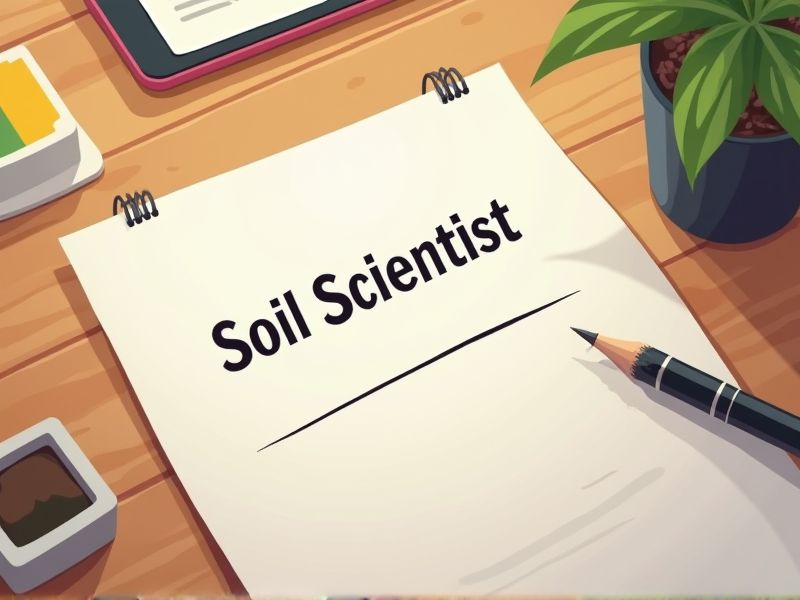
Soil scientists require specialized certifications to ensure they possess the skills and knowledge necessary to address complex soil-related challenges. Certification provides credibility and establishes professional standards, essential for gaining trust in both private and public sectors. Certain certifications can enhance a soil scientist's ability to analyze, interpret, and manage soil resources effectively. Key certifications that may be needed for a soil scientist include:
Certified Professional Soil Scientist (CPSS)
A Certified Professional Soil Scientist (CPSS) is essential because they ensure soil analysis follows established scientific standards, benefiting agriculture, construction, and environmental conservation. Their certification requires continuous education, equipping them with up-to-date knowledge of soil management practices. The CPSS credential also provides credibility and trust, necessary for both regulatory compliance and stakeholder assurance. Furthermore, their expertise aids in identifying and mitigating soil-related issues, such as nutrient depletion and erosion, promoting sustainable land use.
Certified Soil Science Technician (CSST)
The growing need for sustainable agriculture and land management practices requires skilled professionals like Certified Soil Science Technicians (CSST) to support detailed soil analysis. CSSTs provide essential technical assistance to soil scientists, ensuring accurate data collection and analysis, which enhances the effectiveness of soil management strategies. As climate change impacts agricultural productivity, the role of CSSTs becomes critical in adapting soil conservation techniques. Their expertise also contributes to informed decision-making, promoting environmental protection and efficient resource utilization.
Certified Professional in Erosion and Sediment Control (CPESC)
The CPESC certification ensures that soil scientists have the expertise to implement effective erosion and sediment control strategies, reducing environmental degradation. Regulatory agencies often require CPESC certification for professionals involved in land development and construction projects to comply with environmental standards. With this certification, soil scientists can better design and evaluate interventions that minimize soil erosion during construction activities. CPESC holders are recognized for their commitment to continuing education, enhancing their capability to tackle evolving challenges in erosion and sediment control.
Certified Crop Adviser (CCA)
The expertise of a Certified Crop Adviser (CCA) ensures that soil scientists have accurate and relevant data for optimal crop production. CCAs bring practical experience which complements the theoretical knowledge of soil scientists, leading to more informed land management decisions. Their understanding of agronomy helps in translating soil data into actionable farming strategies. Incorporating the insights from CCAs can enhance sustainability practices in agricultural systems.
Geographic Information Systems Professional (GISP)
Geographic Information Systems Professionals (GISPs) enable soil scientists to accurately map and analyze soil distribution and properties, improving the understanding of soil composition in different regions. GIS technology aids in the prediction and management of land use changes, crucial for sustainable agricultural practices and environmental conservation. It helps in modeling erosion patterns and nutrient runoff, allowing soil scientists to devise better land management and soil conservation strategies. Access to geospatial data enhances decision-making processes for soil restoration efforts, ensuring effective interventions in combating soil degradation.
Certified Environmental Professional (CEP)
Certified Environmental Professionals (CEP) provide credibility, ensuring that soil scientists adhere to industry standards. Their certification verifies that soil scientists possess the necessary expertise to analyze and manage soil-related environmental issues effectively. The credential enhances trust among stakeholders, including government agencies and private clients, fostering collaboration on projects requiring soil assessment. This certification helps soil scientists remain updated on evolving environmental regulations and best practices, crucial for effective decision-making and project success.
Certified Professional Agronomist (CPAg)
Agricultural productivity is heavily dependent on soil health, and a Certified Professional Agronomist (CPAg) ensures optimal soil management practices through scientific evaluation. Soil scientists benefit from collaborating with CPAg professionals as they provide expertise in crop growth techniques tailored to specific soil conditions. The CPAg credential reflects a comprehensive understanding of sustainable agriculture, crucial for maintaining long-term soil fertility. The certification provides a structured framework that can enhance decision-making processes regarding soil conservation and pest management.
Certified Soil and Water Conservationist (CSWC)
Being a Certified Soil and Water Conservationist provides a soil scientist with formal recognition of expertise in sustainable land management practices. This certification assures employers and clients of the scientist's competence in implementing effective conservation strategies, which can improve soil health and water quality. The CSWC credential opens up career opportunities, as many organizations prefer or require this certification for roles involving land and water stewardship. It fosters continuous professional development, encouraging soil scientists to stay updated on advancements in conservation techniques.
Professional Wetland Scientist (PWS)
The expertise of a Professional Wetland Scientist (PWS) aids soil scientists in accurately identifying and delineating wetland boundaries, ensuring compliance with environmental regulations. The PWS offers insights into hydrology and vegetation, crucial for understanding wetland soil characteristics. Their collaboration minimizes the risk of misclassification, which can lead to costly legal and ecological consequences. Soil scientists benefit from a PWS's understanding of wetland restoration and management, enhancing project success and sustainability.
LEED Accredited Professional (LEED AP)
Achieving LEED Accredited Professional status enhances a soil scientist's credibility in sustainable land management, promoting environmentally responsible practices. LEED AP knowledge provides these scientists with insights into green building standards, essential for projects aiming for LEED certification. Understanding LEED guidelines helps soil scientists contribute effectively to sustainability goals in development projects, as they can assess and recommend eco-friendly soil practices. Engaging with LEED frameworks enables soil scientists to align their expertise with broader environmental objectives in urban planning and construction.
Summary
When you pursue certifications as a soil scientist, your credibility in the field increases significantly. This enhanced reputation often leads to better job opportunities, as employers value certified expertise. Certification also equips you with updated knowledge and skills, improving your efficiency and performance. Consequently, your career trajectory could experience accelerated growth and professional recognition.
